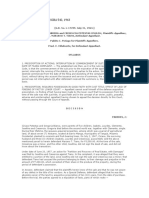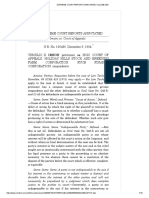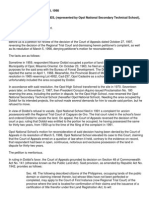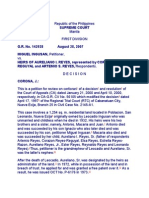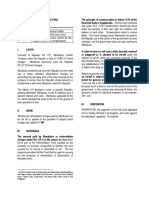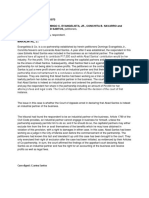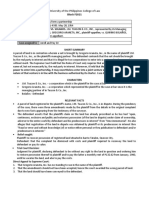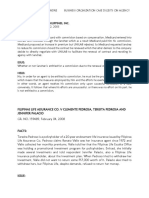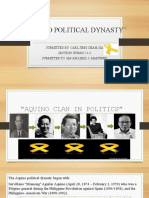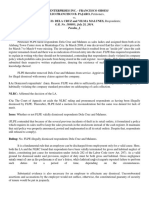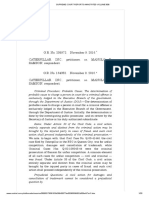Belarmino, Alphonse Louie E.
WF 5:30-7:00 PM
Philippine Health-Care Providers, Inc. (Maxicare) v. Carmela Estrada/Cara Health Services
Facts: Maxicare is a domestic corporation engaged in selling health insurance plans who engaged
the services of Carmela Estrada, who was doing business under the name of CARA HEALTH
SERVICES to promote and sell the MAXICARE PLAN. The former formally appointed the latter
as its “General Agent”, evidenced by a letter-agreement, which provided that CARA’s
compensation shall be in the form of commission. MAXICARE stated that it followed a
franchising system in dealing with its agents whereby an agent had to first secure permission from
MAXICARE to list a prospective company as a client. When Estrada submitted Meralco as a
potential client, MAXICARE directly negotiated with MERALCO, and left Estrada out.
Eventually, MERALCO subscribed with MAXICARE, which prompted Estrada to demand from
MAXICARE that it be paid commissions for said transactions. However, MAXICARE denied her
claims for commission because MAXICARE directly negotiated with MERALCO and that no
agent was given the go signal to intervene in the negotiations. Estrada filed a complaint in the RTC
of Makati City, which found MAXICARE Liable for breach of contract. On appeal, the CA
affirmed the RTC’s decision.
ISSUE: W/N Estrada is entitled to the commission.
HELD: YES.
An agent is one who is engaged, for others, on a commission, negotiating contracts relative
to property with the custody of which he has no concern; the negotiator between the other parties,
never acting in his own name but in the name of those who employed him. A broker is one whose
occupation is to bring the parties together, in matter of trade, commerce or navigation.
An agent receives a commission upon the successful conclusion of a sale. On the other
hand, a broker earns his pay merely by bringing the buyer and the seller together, even if no sale
is eventually made.
We have held that the term "procuring cause" in describing a broker’s activity, refers to a
cause originating a series of events which, without break in their continuity, result in the
accomplishment of the prime objective of the employment of the broker—producing a purchaser
ready, willing and able to buy on the owner’s terms. To be regarded as the "procuring cause" of a
sale as to be entitled to a commission, a broker’s efforts must have been the foundation on which
the negotiations resulting in a sale began. Verily, Estrada was instrumental in the sale of the
Maxicare health plans to Meralco. Without her intervention, no sale could have been
consummated.
�Filipinas Life Assurance Co. v. Clemente Pedrosa, Teresita Pedrosa, and Jennifer Palacio.
Facts: Teresita Pedrosa is a policy holder of a life insurance issued by petitioner. Pedrosa claims
that Valle was her insurance agent and that he collected her monthly premiums. Valle told her that
petitioner was holding a promotional investment program for policy holders which offered 8%
prepaid interest a month for certain amounts deposited on a monthly basis. Enticed, she initially
invested and issued a post-dated check for Php 10,000. In return, Valle issued Pedroso his personal
check for Php 800 for the 8% prepaid interest and a Filipinas Life Agent receipt. Pedroso inquired
about the promo and the petitioner, through branch manager, confirmed and stated that she could
push through with the check she issued. Relying on the representations made, Pedroso waited for
the maturity of her initial investment. However, her investment was returned to her after she made
a written request for its refund. To collect the amount, Pedroso personally went to the Escolta
branch where Alcantara gave her the P10,000 in cash. After a second investment, she made 7 to 8
more investments in varying amounts, totaling P37,000 but at a lower rate of 5% prepaid interest
a month. Upon maturity of Pedroso’s subsequent investments, Valle would take back from Pedroso
the corresponding agent’s receipt he issued to the latter. Pedroso told respondent Jennifer Palacio,
also a Filipinas Life insurance policyholder, about the investment plan. Palacio made a total
investment of P49,550 but at only 5% prepaid interest. However, when Pedroso tried to withdraw
her investment, Valle did not want to return some P17,000 worth of it. Palacio also tried to
withdraw hers, but Filipinas Life, despite demands, refused to return her money.
Issue: W/N Filipinas Life is jointly and severally liable with their branch manager, and
administrative assistant on the claim of Pedroso and Palacio or only its agent Valle is solely liable
to Pedroso and Palacio.
Held: Yes. The general rule is that the principal is responsible for the acts of its agent done within
the scope of its authority, and should bear the damage caused to third persons. When the agent
exceeds his authority, the agent becomes personally liable for the damage. But even when the
agent exceeds his authority, the principal is still solidarily liable together with the agent if the
principal allowed the agent to act as though the agent had full powers. The acts of an agent beyond
the scope of his authority do not bind the principal, unless the principal ratifies them, expressly or
impliedly. Even if Valle’s representations were beyond his authority as a debit/insurance agent,
Filipinas Life thru Alcantara and Apetrior expressly and knowingly ratified Valle’s acts. Filipinas
Life benefited from the investments deposited by Valle in the account of Filipinas Life.
�Sps. Villaluz v. Landbank of the Philippines
Facts: On March 25, 1996, Sps. Villaluz executed a SPA in favor of Agbisit authorizing her to,
among others, negotiate for the sale, mortgage, or other forms of disposition a parcel of land
covered by TCT No. T-202276, and sign in our behalf all documents relating to the sale, loan, or
mortgage, or other disposition of the aforementioned property. On June 19, 1996, Agbisit executed
her own SPA appointing Milflores Cooperative as attorney-in-fact in obtaining a loan from and
executing a real mortgage in favor of LandBank. Milflores entered into transactions with
LandBank, as a representative, but was not able to pay its obligations to the latter. Thus, LandBank
filed a petition for extra-judicial foreclosure sale with the Office of the Clerk of Court of Davao
City. Sometime in 2003, the Sps. Villaluz learned that an auction sale covering their land had been
set. LandBank won the auction sale as the sole bidder. The Sps. Villaluz filed a complaint with the
RTC of Davao City seeking the annulment of the foreclosure sale.
Issue: Whether Agbisit could have validly delegated her authority as attorney-in-fact to Milflores
Cooperative.
Held: Yes.
Art. 1892. The agent may appoint a substitute if the principal has not prohibited him from
doing so; but he shall be responsible for the acts of the substitute:(1) When he was not given the
power to appoint one;(2) When he was given such power, but without designating the person, and
the person appointed was notoriously incompetent or insolvent.All acts of the substitute appointed
against the prohibition of the principal shall be void.Art. 1893. Tn the cases mentioned in Nos. 1
and 2 of the preceding article, the principal may furthermore bring an action against the substitute
with respect to the obligations which the latter has contracted under the substitution.
In this case, there was valid delegation since the SPA executed by the SPS. Villaluz had
no specific prohibition against Agbisit appointing a substitute.
�Florentina Bautista-Spille v. Nicorp Management and Development Corporation
Facts: Petitioner is the registered owner of a parcel of land located in Imus City, Cavite. Petitioner
and her spouse, executed a General Power of Attorney in favor of her brother, respondent
Benjamin Bautista authorizing the latter to administer all her businesses and properties in the
Philippines. The said document was notarized before the Consulate General of the Philippines,
New York, United Stated of America. Benjamin and Nicorp entered into a contract to sell which
pertained to the land owned by Petitioner. While there was no full payment yet, the certificate of
title was deposited with IE bank. When petitioner discovered the sale, her lawyer immediately sent
demand letters to respondents, informing them that she was opposing the sale of the subject
property and that Benjamin was not clothed with authority to enter into a contract to sell.
Respondents, however, failed and refused to return the title of the subject property. Petitioner filed
a complaint before the RTC against respondents for the declaration of nullity of the contract to
sell, which rendered the contract void. On appeal, the CA reversed the decision of the RTC.
Issue: W/N the General Power of Attorney authorized Benjamin to enter into a contract to sell with
the respondent corporation
Held: NO
The well-established rule is when a sale of a parcel of land or any interest therein is through
an agent, the authority of the latter shall be in writing, otherwise, the sale shall be void. Thus, the
authority of an agent to execute a contract for the sale of real estate must be conferred in writing
and must give him specific authority, either to conduct the general business of the principal or to
execute a binding contract containing terms and conditions which are in the contract he did
execute.
Art. 1878 of the Civil Code also provides that a Special power of attorney is necessary to enter
into any contract by which the ownership of an immovable is transmitted or acquired either
gratuitously or for a valuable consideration. For the principal to confer the right upon an agent to
sell real estate, a power of attorney must so express the powers of the agent in clear and
unmistakable language. When there is any reasonable doubt that the language so used conveys
such power, no such construction shall be given the document. It is a general rule that a power of
attorney must be strictly construed, and courts will not infer or presume broad powers from deeds
which do not sufficiently include property or subject under which the agent is to deal. Thus, when
the authority is couched in general terms, without mentioning any specific power to sell or
mortgage or to do other specific acts of strict dominion, then only acts of administration are
deemed conferred.
Doubtless, there was no perfected contract to sell between petitioner and NICORP. Nowhere in
the General Power of Attorney was Benjamin granted, expressly or impliedly, any power to sell
the subject property or a portion thereof. The authority expressed in the General Power of Attorney
was couched in very broad terms covering petitioner's businesses and properties. Time and again,
�this Court has stressed that the power of administration does not include acts of disposition, which
are acts of strict ownership. As such, an authority to dispose cannot proceed from an authority to
administer, and vice versa, for the two powers may only be exercised by an agent by following the
provisions on agency of the Civil Code.
�Sevilla v. CA
Facts: On the strength of a contract, TWS leased the premises belonging to Mrs. Segundia Noguera
for the former’s use as a branch office. Lina Sevilla bound herself solidarily liable with TWS for
the prompt payment of the montly rentalst thereon. When the branch office was opened, it was run
by appellant Sevilla payable to TWS by any airline for any fare brought in on the efforts of Sevilla,
4% was to go to Sevilla and 3% was to be withheld by TWS. TWS appears to have been informed
that Sevilla was connected with a rival firm, the Philippine Travel Bureau, and, since the branch
office was anyhow losing, the TWS considered closing down its office. Two resolutions of the
TWS board of directors were passed to abolish the office of the manager and vice president of the
branch office and authorizing the corporate secretary to receive the properties in the said branch
office. Subsequently, the corporate secretary went to the branch office, and finding the premises
locked and being unable to contact Sevilla, Padlocked the premises to protect the interests of TWS.
When neither Sevilla nor her employees could enter the locked premises, she filed a complaint
against TWS with a prayer for the issuance of a mandatory preliminary injunction. The trial court
dismissed the case holding that TWS, being the true lessee, was within its prerogative to terminate
the lease and padlock the premises. It likewise found that Sevilla was a mere employee of TWS
and as such, was bound by the acts of her employer. The CA affirmed. Hence, this petition.
Issue: W/N there was no EE-ER relationship between TWS and Sevilla.
Held: No. It was a principal-agent relationship.
In the first place, under the contract of lease, she had bound herself in solidum for rental
payments, an arrangement that would belie claims of master-servant relationship. This does not
make her an employee of TWS, since a true employee cannot be made to part with his own money
in pursuance of his employer’s business, or otherwise, assume any liability thereof.
In the second place, when the branch office was opened, the same was run by the appellant
Sevilla payable to TWS by any airline for any fare brought in on the effort of Sevilla. Thus, it
cannot be said that Sevilla was under the control of TWS. Sevilla in pursuing the business, relied
on her own capabilities. It is further admitted that Sevilla was not in the company’s payroll. For
her efforts, she retained 4% in commissions from airline bookings, the remaining 3% going to
TWS. Unlike an employee, who earns a fixed salary, she earned compensation in fluctuating
amount depending on her booking successes. The fact that Sevilla had been designated branch
manager does not make her a TWS employee. It appears that Sevilla is a bona fide travel agent
herself, and she acquired an interest in the business entrusted to her. She also assumed personal
obligation for the operation thereof, holding herself solidary liable for the payment of rentals.
Wherefore, TWS and Canilao are jointly and severally liable to indemnify the petitioner,
Sevilla.

